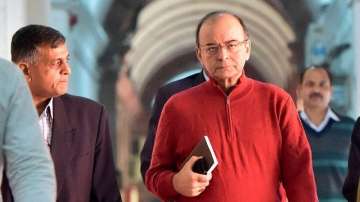How Arun Jaitley transformed Indian economy with 10 major reforms
Arun Jaitley was the only minister who was alloted two heavyweight portfolios - defence and finance, in the first Modi cabinet.

Former Finance Minister Arun Jaitley left for his heavenly abode Saturday. The news of his demise came as a shock and left the nation teary-eyed. Arun Jaitley had been suffering from prolonged illness and was being treated at AIIMS in Delhi. The former Finance Minister passed away at 12:07 pm. Arun Jaitley was the only minister who was alloted two heavyweight portfolios - defence and finance, in the first Modi cabinet. During his tenure as the Finance Minister, Arun Jaitley had taken a number of relevant decisions that transformed the economy of the country.
Here are the 10 major reforms undertaken by Finance Minister Arun Jaitley- Implementation of GST: Arun Jaitley brought one of the most relevant reforms in the Indian economy. The Goods and Services Tax (GST) was introduced under Jaitley as Finance Minister at midnight on July 1, 2017. The move on GST brought the country under a unified tax regime and ended 17 taxes and 26 cess operational in the country.
- Demonetisation: The Narendra Modi government was able to implement a key decision - note ban, during Arun Jaitley as Finance Minister. The move put a ban on Rs 500 and Rs 1000 notes, since November 8, 2016. Demonetisation came as an important move to curb corruption and black money in India.
- Digital India: This was one step that promoted cashless transactions in the Indian economy and ensured the government's services are made available to the citizens of the country electronically.
- Rail Budget: Former Finance Minister Arun Jaitley broke the norm of presenting a separate rail budget in the country. In a major step, Arun Jaitley merged the rail budget with the Union budget. Ever since, the provisions of railway budget are announced as part of the Union budget.
- E-Way bill: The E-Way bill was approved by the GST Council under former Finance Minister Arun Jaitley, which extended the GSTR-3B form for another three months. Announcing the decision, Jaitley had said a decision on a simplified tax form is yet to be taken.
- FDI: Former Finance Minister Arun Jaitley worked towards easing the norms of foreign direct investment (FDI) in India, which opened the doors for major investment opportunities in the Indian market.
- Jan Dhan Yojana: Along with Prime Minister Narendra Modi, the then finance minister Arun Jaitley had launched the Jan Dhan scheme for the underprivileged. This move connected millions, who had been deprived of banking services, with banks.
- Merger of Bharatiya Mahila Bank with SBI: The decision to merge the Bharatiya Mahila Bank with the State Bank of India (SBI) ensured greater banking services outreach to more women at a faster pace. It was taken in view of the advantage of the large network of SBI among other things.
- Insolvency and Bankruptcy Code, 2016: One of the most significant measures undertaken by former Finance Minister Arun Jaitley was to address the substantial increase in the level of distressed debt in India. The Insolvency and Bankruptcy Code was a remarkable step towards resolution of stressed assets.
- Change in date of Union budget: Arun Jaitley broke the norm of presenting the Union Budget on the last working day of February. The move aimed at materialising the provisions before the beginning of a new financial year.
Also Read | Lost someone whom the nation needed for many years: Kapil Sibal remembers Arun Jaitley
Also Read | Jaitley's demise a personal loss for me: Amit Shah
Former Finance Minister Arun Jaitley passes away
Follow for news related to Arun Jaitley